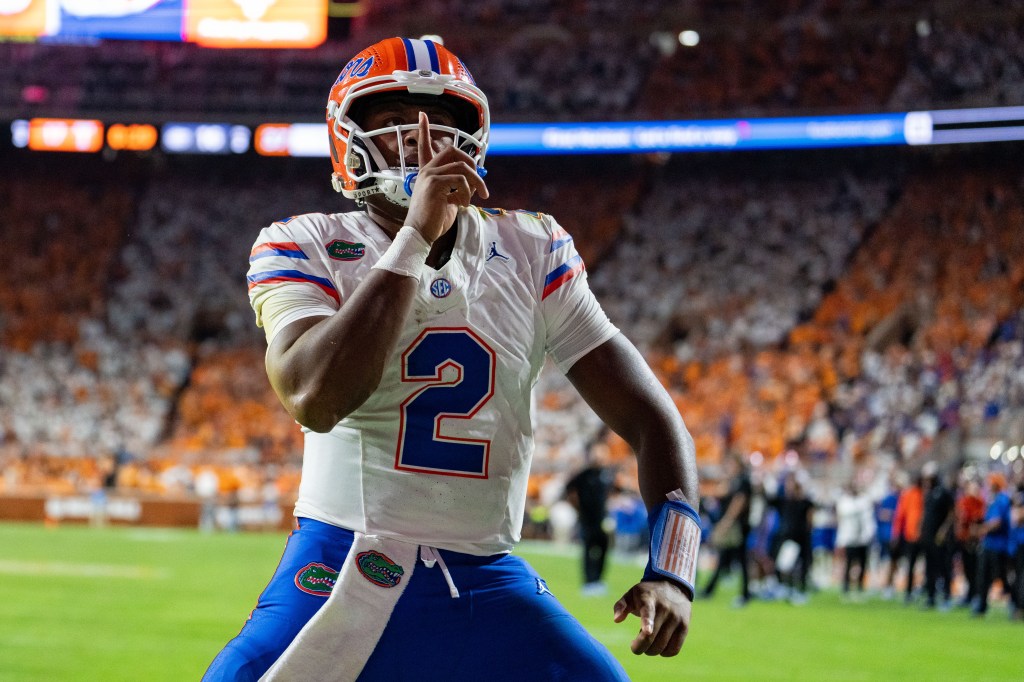What is the annual salary of University of Florida quarterback DJ Lagway?
What is UCF defensive tackle John Walker being paid?
How much are state taxpayers kicking in to underwrite the decision of quarterback Thomas Castellanos to transfer from Boston College to Florida State?
As taxpayers, we have a right to know.
It’s no secret that the era of amateurism in college athletics is officially over. With the NCAA’s multibillion-dollar House v. NCAA settlement clearing the way for direct payments to athletes, public universities across the country — including here in Florida — are preparing to write some very real paychecks to their football and basketball players.
But there’s one key question few are asking:
If these athletes are going to be paid by public universities, shouldn’t their salaries be made public — just like every other state employee?
The principle here isn’t complicated. The salaries of coaches are public. And university presidents. And tenured professors. And custodians. Even your local high school teacher salaries can be found online with a few clicks. That’s because if taxpayer dollars support public institutions then, well, transparency is part of the deal.
And guess what? Thanks to a new amendment recently passed by the Florida Board of Governors, direct taxpayer dollars are soon going to be used to pay athletes. The amendment allows state public schools (Florida, Florida State, UCF, etc.) up to $22.5 million per year in “auxiliary” funds to help fund direct payments to athletes (sorry, University of Miami, you’re a private school, which means your athletes don’t get to milk the public teat). This is all part of a financial burden brought on by the NCAA’s settlement, which allows schools to shell out up to $20.5 million annually to pay its athletes (mostly college football players).
That means schools like FSU, UF and UCF could soon directly be paying top athletes six figures or more with funds ultimately stemming from campus operations — not ticket sales or booster donations alone.
Translation: These athletes are about to become, in effect, state employees in all but title. And if we hold state employees to a standard of transparency, why should college athletes be excluded?
For decades, Florida’s universities operated under a reasonable rule: Athletic departments must be financially self-sufficient. If you want to play the high-stakes game of major college sports, you fund it through media rights, ticket sales, donations and merchandising. Don’t come crying to the academic side of the house — or the campus bookstore — when you’re overextended.
But that principle is now out the window.
The Florida Board of Governors’ amendment — which, according to Warchant.com, was pushed by FSU board of trustees chairman Peter Collins and others — is a complete reversal of past policy. It allows schools to divert funds from auxiliary services — campus bookstores, housing and parking — to cover the cost of athlete revenue-sharing through 2028. They’re calling it a “temporary” funding mechanism, but does anybody really think it’s going to end after three years?
When it comes to spending in college athletics, the bloated support staffs, the palatial facilities and the eight-figure coaching buyouts never end.
Florida State, in particular, has been vocal about its need for financial assistance. It’s no secret the Seminoles sued their own conference — the ACC — in a successful attempt to force the league to give FSU more money. According to Warchant.com, FSU athletic director Michael Alford told his board of trustees that the Seminoles will need an additional $25 million per year to meet the new cost structures. Now thanks to the amendment, they’ll be able to take a large portion of that from the very students who pay for dorms and parking permits.
Let that sink in. An athletic department that boasts an annual budget nearing $200 million is getting a green light to dip into campus-life coffers to pay athletes — and still hasn’t explained how, or to whom, the money will be distributed. That’s not just bad optics; it’s bad governance.
When you start using auxiliary funds — paid by students and derived from public resources — to help fund athlete pay, the old weak argument that “these aren’t public dollars” loses all credibility. And once that line is crossed, then it’s imperative that these salaries be made public.
We know what FSU coach Mike Norvell makes (too much). We know what the dean of the College of Engineering makes. We even know what the campus parking manager makes. But we won’t know how much a starting quarterback or star point guard is earning under this new model?
That’s absurd.
This isn’t a privacy issue. Salaries of public employees — including athletes in this new quasi-employee model — are public because accountability and fairness demand it. It’s how we know when a department is overpaying, when one employee is being undercompensated or when resources are being mismanaged. If we’re going to treat players like pros, let’s also treat the process like a professional one.
Don’t get me wrong, I get why all of this is happening. Florida’s pom-pom waving politicians are just trying to keep up with the pom-pom waving politicians in other states. Around the country, state lawmakers are twisting tax codes, raiding campus funds and rewriting financial rules to keep their flagship programs competitive.
In Louisiana, legislators are moving to raise taxes on sports betting to funnel more than $24 million annually into the athletic departments at top public universities — money that everyone knows is meant to help pay athletes.
In Arkansas, incredibly, the state became the first to waive state income taxes on compensation made by college athletes. Can you believe it? Low-paid service workers and ditchdiggers in Arkansas have to pay state income taxes but the millionaire college quarterback doesn’t?
What are we doing here?
In Kentucky, the University of Kentucky’s board of trustees recently approved a $31 million operating loan to cover costs associated with paying athletes under the new model. That’s not a booster bailout; it’s a taxpayer-backed loan for a sports program.
The message is clear: States across the country are now directly supporting athlete compensation through financial maneuvers designed to keep schools competitive in an increasingly professionalized college sports environment.
As David Carter, founder of the Sports Business Group and an adjunct professor at USC, told the Associated Press: “These bills, and the inevitable ones that will follow, are intended to make states ‘college-athlete friendly.’ But they will no doubt continue to stoke the debate about the perceived preferential treatment afforded athletes.”
Carter’s right. And one way to tamp down that perception? Be transparent.
The bottom line is this:
If state universities are going to open up the public vault to pay their athletes, then the public has a right to see the ledger.
Email me at mbianchi@orlandosentinel.com. Hit me up on X (formerly Twitter) @BianchiWrites and listen to my Open Mike radio show every weekday from 6 to 9:30 a.m. on FM 96.9, AM 740 and 969TheGame.com/listen


